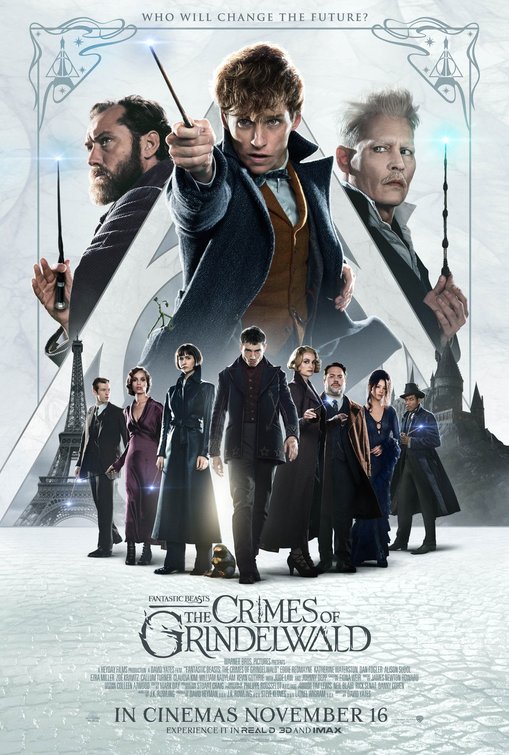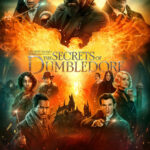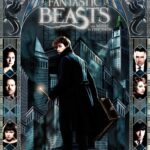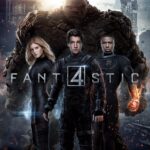The Fate Of One. The Future Of All.
Director
David Yates
Starring
Eddie Redmayne
Katherine Waterston
Dan Fogler
Alison Sudol
Ezra Miller
Jude Law
Johnny Depp
Shortly after the events of Fantastic Beasts And Where To Find Them, we are shown the prison break of notorious criminal and radical wizard Gellert Grindelwald [Depp]. We are then reintroduced to Newt Scamander [Redmayne] who has been told by the Ministry Of Magic that he can no longer travel internationally after the events in New York. Newt is then contacted by Albus Dumbledore [Law] who tells him that Grindelwald is in Paris. At the same time, Newt is reunited with his muggle friend Jacob Kowalski [Fogler] and his girlfriend Queenie [Sudol]. With their relationship illegal in the United States, they have plans to elope but Jacob is fearful of the consequences, causing a rift between the two. Queenie then rushes off to spend time with her sister, Tina [Waterston], who is investigating the location of Credence [Miller] who survived his attack at the end of the last movie. And so the principal cast all gravitate toward Paris.
In order to discuss this movie in depth, I need to cover a few spoilery reveals, so to start with, let’s talk about the technical accomplishments. As with the first (and indeed all the Harry Potter films) the production design and aesthetic are still marvellous. From the costuming to the locations and sets, there is a truly beautiful level of detail and majesty that makes up these spectacularly levelled visual feasts. Granted, the French magical world could have used further development outside of “it’s like everything you’ve already seen but with an accent and cats.” But for every magnificently crafted physical creation there is a layer of CGI slapped all over it to ruin everything. Five years ago it became apparent that blockbusters are too reliant on computer generated imagery and a shift started to bring a harmonious balance between practical and digital effects. Crimes Of Grindelwald has the unfortunate distinction of badly pairing the two with erratic camera movements and direction ensuring that we literally can’t tell what the fuck is going on. A great comparison I could give would be the prequel to The Thing, irritatingly titled The Thing. The original is one of the best uses of amazing and horrifying practical effects in cinema history and while several members of the prequel team wanted to create something in a similar vein, it was laced with CGI that did not compliment the practical element and left a very mediocre final result. This film is almost so aware of this fact that the camera moves around and cuts so jarringly that it takes a little too long to adjust to what you’re seeing – and woe betide anyone watching this in 3D.
Performance-wise there are essentially two tiers, the well acted and the obsolete. That may sound incredibly harsh but for a cast of this scale it is an unfortunate by-product. The first Fantastic Beasts film offered a chance to get away from the central canon with new characters who can stand on their own. And while they achieved that for a time, the nature of the prequel (and how they have been handled to date) is that they inevitably come back to the familiar the longer they go on. Law is perfectly serviceable in the role of Dumbledore but isn’t exactly given much to work with, Redmayne returns to the role of Newt pleasantly but the other veterans felt wasted with contradictions and developments that force them apart solely for the purpose of getting them to the next set-piece. One of the biggest frustrations is the villainous elements in the form of Credence, who is still effectively a puppet and Grindelwald himself, who was sinister and calculating as Colin Farrell but is devolved into an incredibly weak and confusing adversary; throughout the first film Credence was a misdirect before being revealed as important and now we have prophecies, schedules and agendas that must be observed to fulfil his destiny – all of which feels like an antithetical pivot for the sake of dragging out events.
This movie has gaping plotting issues. The coincidences are infuriating, there is practically zero tension throughout and by the end of the movie nothing feels accomplished. On top of that we have character shifts that feel like a betrayal to what has already been established and allegiances and pointless character deaths that are robbed of significance because we haven’t gotten to know the characters yet. As the film progresses, it becomes too bogged down in its own spiralling mystery that it leaves the whole film feeling a little less magical, only really reminding us that this takes place within the Potter universe thanks to the Hogwarts flashbacks. This may sound like a slight contradiction, saying that I wanted these characters and locations to stand on their own but by trying to make a more adult story it has forgotten to instil in the audience a sense of wonder at this world. By focusing on bureaucrats rather than children, the world of magic is left mundane and bland. Then we have Grindelwald’s big speech, his rallying cry to his fellow wizards, justifying coming out of the shadows to avert World War 2. Now, this is very tricky ground because when you pair a very real travesty with a fictional setting, you are immediately on this ice. The first film mentioned the First World War but in a way that impleid it affected all communities. That’s fine, that works. This film features a vision of WWII that includes concentration camps. On the one hand the weight of significance is vitally important and with the nature of the story, having a specific sect of society being targeted for genocide feels like an appropriate link but as a plot point in a mediocre film, it just felt uncomfortable. On the other, it’s worth noting that the first Fantastic Beasts had a great deal of political reflection regarding acceptance and neglect leading to radicalisation, while this movie addresses enigmatic figures manipulating embittered feelings leading to acceptance of unacceptable ideals; which is a message films with a big budget have a responsibility to take, as art. But none of that really matters (which is arguably part of the problem) because these movies have now set up a formula which mimics big TV shows like Game Of Thrones or The Walking Dead wherein we get 80% filler which gives way to a huge exposition dump followed by a last minute cliff-hanger reveal that will hopefully keep the audience hungry for more when it all it actually does is breed a sense of familiarity for another huge franchise.
Which brings us to Star Wars. The aforementioned grand plans and significance of Credence’s character elevates him from monster-of-the-week bad guy to franchise shifting key player and all of it feels like it comes out of nowhere. But this is now standard fare for prequel releases. There is an underlying acknowledgement that the prequel story is not the interesting one (if it were, it would have been told in the first place). While we can draw lots of comparisons with the cinematic handling of The Hobbit and the diminishing rate of return with every mounting instalment, that one is somewhat different as the source material was released before The Lord Of The Rings but with Star Wars it was painfully obvious that none of its contents were important, everything was an attempt to revise plot holes and water down the mythology by solidifying it with evidence; like having a treasured memory spoiled by watching a video of that moment played back and realising it wasn’t exactly how you had been remembering it all along. We have already seen the rise and fall of Voldemort and Harry Potter, why do we care about Grindelwald’s attempts to start a war that either never happened or was quickly superseded by an even greater threat. The actions of Henry VII were very important for the nation of Britain but Henry VIII had the greater impact for the mainstream. The first film had its issues but it was serviceable. The best thing about it was the world building but this film suffered by neglecting that and committing the seemingly inevitable prequel sin of name dropping left-and-right in the hope it will assuage fans but often ends up confusing or angering them while alienating those without an encyclopaedic knowledge of the franchise. It also tends to mean that this vast, expansive universe is populated with “specials,” i.e. those families of note and importance that influence everything. Meaning progenitors and bloodlines are the most important things and characters can’t simply be introduced without being Draco Malfoy’s great uncle or Hagrid’s third cousin, it both limits and confines the possibilities and stifles the gene pool. I would have like Fantastic Beasts to be an exploratory step away from the British wizarding world but instead, it’s found its way straight back to Hogwarts and the various revelations feel largely like revisions, taking huge logic leaps to justify a twist that nobody really needed.
Ultimately, this movie is a disappointment. For those who liked Fantastic Beasts, this feels like a cold, flabby addition, for those who didn’t like the first, this will be just as unpalatable and for Harry Potter fans, it may raise some interesting questions about the canon but will never be anything more than a bridge to those talking points that few will have the overwhelming desire to revisit outside of completionism.
Release Date:
16th November 2018
The Scene To Look Out For:
Random comment to make but I actually enjoyed Nagini’s introduction scene. Not because of the acting (although it was fine), not for visual effects (also fine) an not for the headache it gave fans to learn that Voldemort’s loyal servant and horcrux is an Asian lady (which isn’t really fine) but for the music. James Newton Howard’s score works well enough and I like that the title music has been kept as that is one of the best motifs outside of the regular Harry Potter fanfare but the Nagini theme was genuinely enjoyable and one which elevated a very dry scene.
Notable Characters:
**Spoilers mentioned within**
In my review for Fantastic Beasts, I mentioned one of the highlights being the character of Jacob Kowalski and his relationship with mind-reader, Queenie Goldstein. While I was grateful this film brought them back, they robbed a lot of the positivity that came with them due to circumstance – and no matter how they sell the idea of Queenie joining Grindelwald, it was a cheap and stupid development that made no sense a) coming from a mind reader and b) based on her actions in the first film. And don’t tell me it was because it would keep them together because that’s nonsense.
Highlighted Quote:
“There are no strange creatures, just blinkered people”
In A Few Words:
“A barren cinematic spectacle that tries to justify its runtime and contents with some uninspired last minute revelations”
Total Score: 2/5

![The Red Right Hand Movie Reviews [Matthew Stogdon]](https://reviews.theredrighthand.co.uk/wp-content/uploads/2021/12/cropped-header1.png)



